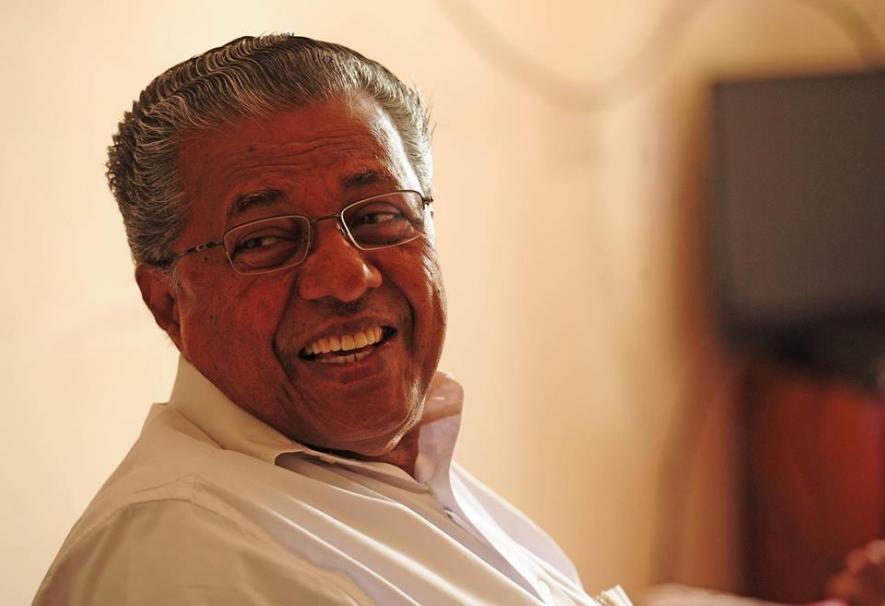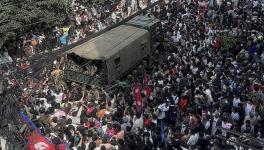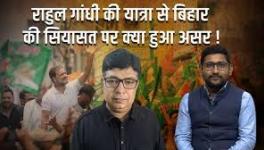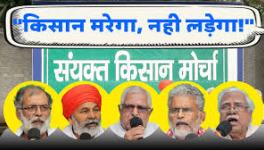Our Goal Is to Ensure an Alternative Secular Govt Is Formed at the Centre: Pinarayi Vijayan

As Kerala Chief Minister, Pinarayi Vijayan, 75, polit bureau member of the Communist Party of India (Marxist), has been making news for the Left Democratic Front (LDF) Government’s deft handling of two big challenges -- the worst ever floods that wreaked havoc in the state, and countering the communal agenda of the Sangh Parivar and its outfits to unleash violence on the issue of women’s entry into the Sabrimala shrine. “Kerala remained a peaceful place, thanks to the level headedness of the people and the progressive interventions of the Left parties and the LDF Government,” the Kerala CM, who is leading the election campaign for the LDF in Kerala, tells Newsclick in an interview.
What are the key campaign planks of the LDF in Kerala as it approaches the people during the Lok Sabah elections?
A.The upcoming general election is decisive as far as Indian democracy is concerned. We have seen how the Rashtriya Swayamsevak Sangh (RSS) and the Bharatiya Janata Party (BJP) have been trying to undo every positive element of modern India, including our secular values, constitutional bodies and autonomous institutions. Therefore, this is an avenue to uphold the idea of India. It is a battle to save the soul of India, a means to ensure that India belongs to all Indians.
The Left has played a significant role in exposing our current Union Government, which is by far the most anti-people government we have had in Independent India. Thus, minorities, dalits, farmers, students, writers and all those who have faced the brunt of the current regime have all risen up in protest, fighting for their rights and lives. Surely, the Indian people will vent their anger against this ruthless government in the upcoming general elections.
For the LDF, our first goal is to defeat the RSS-led BJP Government at the Centre. Second, we are appealing to the people to ensure that the strength of the Left parties is increased in the Lok Sabha. Our final goal is to ensure that an alternative secular government is formed at the Centre.
The Congress has been claiming that since there is no chance of a Leftist government coming to power at the Centre, it is pointless to vote for the LDF. What is your response to this? Why is it essential to have Leftist MPs in Parliament?
A. In many of the states, regional parties have taken up the mantle in the fight against this deadly RSS-BJP combine at the Centre, as far as electoral alliances go. Therefore, it remains to be seen if the Congress will actually have any role to play in the next Central government.
As I mentioned earlier, the Left has played a pivotal role in the people's struggles against this present anti-people rule. In the future too, the working class and marginalised -- including minorities, dalits, tribals, women and so forth -- can count only upon the Left to take up their issues sincerely and stand by them steadfastly. For India to remain a secular democracy, where the rights of all sections of the people are upheld, it is essential to have Leftist MPs in Parliament.
The Left has been the ones fighting to retain India's sovereignty. We have also been in the forefront of the struggles to safeguard our natural and national resources. At the same time, both the Congress and BJP-led governments at the Centre have only sought to dilute our sovereignty and sell off our assets. To ensure that India is not sold off by the corporate-political nexus which sets and runs the neo-liberal agenda, it is essential for the Left to be represented significantly in Parliament.
The BJP has been following a communal strategy with the aim of polarising society. The Congress has taken a similar position in Kerala. How does the LDF plan to counter this campaign?
A. Sadly, it is true that the Congress, which claims to be a secular political party, has gone along with the communal agenda being pursued by the BJP. However, Kerala’s society is not one that thinks communally. Kerala has a long and rich history of renaissance and secularism and the people of Kerala are keen to ensure that our society remains so.
Over the last few months, the Kerala society has realised very well, who is capable of upholding those cherished values and taking everyone together into the future, towards progress. Even when there were orchestrated efforts to fan communal tensions and cause riots, Kerala remained a peaceful place, thanks to the level headedness of the people and the progressive interventions of the Left parties and the LDF government.
We’ve been able to ensure that Kerala society remains progressive, by overcoming the various challenges posed by communal and vested interests that seek to destroy our unity. Our unity has helped us overcome natural and man-made challenges and the people of Kerala realise that it is the presence of the CPI (M) and the LDF that has kept our unity intact.
The Opposition claims that the State government is merely completing the projects initiated by the previous government. How would you respond to this claim? How is the approach of the LDF government different from previous governments on development?
A. Our idea of development is not to focus on select areas or select sectors alone, ours is a comprehensive take on development, which is rooted in sustainability and social justice. When such an all-pervasive approach on development was missing during the previous government, all they can resort to are false claims.
What we have done is to initiate fresh projects that are absolutely essential for the overall development of the state, while also completing projects that were abandoned by the previous government. Our four missions that are tailor-made to meet the requirements of the state -- Haritha Keralam, Aardram, LIFE and Pothu Vidyabhyasa Samrakshana Yajnjam -- have been internationally appreciated, and I am sure that you have seen or read stories about how each of them has made significant changes in Kerala's society.
On developmental initiatives, the LDF government's performance has been exemplary. We have left no stone unturned to realise major projects, such as National Highway, National Waterway, GAIL pipeline, LNG Terminal, Kochi Metro, Water Metro, Kannur Airport, Coastal Highway, Hill Highway and so on. We have turned around our public sector undertakings into profit-making entities and strengthened our traditional industries. In a national scenario of job loss, we are creating fresh jobs in the state, creating 20,000 additional posts and appointing around 100,000 youngsters through the Public Service Commission alone.
We have also focused considerably on the IT sector; attracting international giants, like Nissan and Fujitsu, to set shop in the state. We have declared internet as a right to our citizens and are linking all offices and houses in the state with a high-speed optical fiber network. We are also providing free WiFi in public spaces, thus integrating our people with the digital world.
At the same time, we have been able to provide the highest welfare pensions in the country, retain SCP (Special Component Plan for Scheduled Castes) and Tribal Sub-Plan, implement gender budgeting, enact a policy for transgenders, make public places differently-abled friendly and so on.
We have made the revolutionary move of appointing people from backward sections - including Dalits - as priests in Dewaswom Board Temples in the state. Our interventions on welfare measures and social justice speak for themselves. To us, without such an all-round approach, real development cannot be attained.
What have been the key achievements of your government in rebuilding Kerala after the floods and the participation of the people in these initiatives? The Congress and BJP have alleged that the government was responsible for the extent of damage. Your comments.
A. Our biggest achievement was in making sure that the people of the state stood united in the face of a historic challenge and in creating the belief that together we can overcome the disaster. We were able to channel all our energy and resources into rescue and rehabilitation, which was our primary focus when the floods hit us.
Now we are focusing on rebuilding. Our first priority was to give financial assistance to all those affected by the floods. We gave Rs. 10,000 to around 700,000 families affected by the floods. Then we focused on rebuilding roads and homes. It is nearing completion now. The Rebuilding Kerala Initiative is a colossal task which will take 2-3 years to be completed. Sustainable livelihoods will be ensured and only environment-friendly construction will be resorted to, through the Rebuilding Kerala Initiative.
The extent of rains that Kerala experienced in a short span of time -- more than three times the predicted rain during the second week of August 2018, when our reservoirs were already at full capacity -- is unparalleled in the history of the state. The fact that our water and dam management was impeccable has been pointed out by none other than national agencies like the Central Water Commission. In fact, the devastation caused by the floods was curbed to a large extent because of such precise management. The government worked round the clock to ensure that the damage was minimal and timely rescue and relief operations were carried out. At a time when even international agencies have praised our efforts, such ill-founded political allegations have been rejected by the people of Kerala.
The past five years witnessed a low in Centre-State relations and an attack on federal principles. How did this affect the people of Kerala? Do you think the situation may change for the better after the 2019 elections?
A. Over the past five years, we have seen a steady attack on the rights of the states. GST (goods and services tax) was one such move. Now that it has been implemented, the states have limited means of generating their own revenue. States are being forced to implement Central schemes which are planned in a 'one size fits all' format. And, when states dare to tailor-make programmes that are best suited for their realities, the Centre refuses to help. Thus, we are forced to seek assistance from the Centre, instead of devising our own means to run our schemes.
The fact that international agreements are being entered into, which would be detrimental to the interests of the states, without consulting the states is another attack on our much-cherished federal principles. The drop in the prices of rubber is a classic case study on how federal principles are being disregarded. We have continually asked for imports of rubber to be curbed and import duties to be strengthened. However, duties were continually slashed and unregulated imports were encouraged. Thus, prices of rubber plummeted. The case of black pepper is similar. Kerala requested the Centre to institute a Price Stability Fund for rubber. But our request fell on deaf ears. However, we created such a fund of Rs. 500 crore on our own initiative.
As far as Kerala is concerned, we have seen the Centre's lack of response on our proposal for the development of the coastal areas and on our request for assistance following the floods. We were even denied voluntary help that was offered to us from our friendly nations and prevented from visiting Malayalees around the world to seek their assistance in rebuilding the state. From experience we can say that unhealthy Centre-state relations in general and the fiscal relations in particular have put our state at a great disadvantage.
Therefore, it is the need of the hour to undertake a total restructuring of the Centre-state relations, in such a way that it will enrich both the Centre and the states. If the Left and the regional parties do well in the general elections, we can hope for some positive change in that direction.
What should be the priorities of the new government that comes to power at the Centre in 2019?
A. An alternative secular government formed at the Centre will have its task cut out for it. First and foremost, it should reaffirm that the Indian Constitution is supreme and make clear that no effort to alter its fundamental principles will be tolerated. The confidence of the Indian public in our secular credentials, constitutional bodies, autonomous institutions and democratic ethos needs to be restored. Equally important would be the task of healing the wounds caused by the unabashed communal and casteist polarisation carried out during the past few years.
It is imperative to put an end to the plight of farmers and make farming profitable by increasing government spending in agriculture and reinstating subsidies that have been steadily cut. The rights of our workers, which have been eaten up as a result of the pursuance of neo liberal policies have to be restored. Demands such as minimum wage of Rs. 18,000 per month, social security for unorganised workers and so on need to be implemented without delay.
Forced takeover of adivasi land needs to be checked. The safety and security of women need to be ensured. Scholarships and stipends of students which have been razed should be reinstated. A spirit of scientific enquiry and temper should be championed over myths and pseudo-science being presented as facts. Serious effort ought to be made to ensure that our federal principles are adhered to.
Ultimately, the new government should be one that represents the interests of the Indian public as a whole and takes our society forward in a spirit of unity, imbibing a progressive ethos.
Get the latest reports & analysis with people's perspective on Protests, movements & deep analytical videos, discussions of the current affairs in your Telegram app. Subscribe to NewsClick's Telegram channel & get Real-Time updates on stories, as they get published on our website.
























